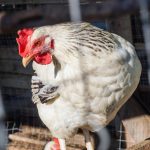Chickens exhibit distinctive nesting behaviors rooted in their natural instincts. In the wild, they seek secluded, protected locations to lay eggs, safeguarding them from predators. This instinct persists in domesticated chickens, necessitating the provision of secure and comfortable nesting environments.
The social hierarchy within a flock, known as the pecking order, influences nesting behavior. Dominant hens typically claim preferred nesting spots, compelling lower-ranking hens to seek alternative locations. This dynamic must be considered when designing nesting areas to ensure all hens have access to suitable spaces.
Chickens are creatures of habit and tend to return to familiar nesting sites where they feel safe and comfortable. This behavior is important to consider when establishing nesting boxes, as it can promote consistent egg-laying patterns. Understanding and accommodating these natural behaviors is essential for creating an optimal nesting environment for chickens.
Table of Contents
- 1 Providing alternative nesting options
- 2 Using deterrents to keep chickens out of nesting boxes
- 3 Keeping nesting boxes clean and unappealing
- 4 Monitoring and addressing any issues with nesting behavior
- 5 Creating a comfortable and secure coop environment
- 6 Seeking professional advice if necessary
- 7 FAQs
- 7.1 What are nesting boxes for chickens?
- 7.2 Why do chickens need to be kept out of nesting boxes?
- 7.3 How can I keep chickens out of nesting boxes?
- 7.4 What are some natural deterrents to keep chickens out of nesting boxes?
- 7.5 Are there any commercial products available to keep chickens out of nesting boxes?
- 7.6 What are the benefits of keeping chickens out of nesting boxes?
Key Takeaways
- Chickens have natural nesting instincts and prefer dark, secluded spaces for laying eggs
- Providing alternative nesting options such as fake eggs or secluded areas can help deter chickens from using unwanted nesting boxes
- Using deterrents like wire mesh or fake predators can discourage chickens from using nesting boxes
- Keeping nesting boxes clean and unappealing by regularly removing eggs and adding fresh bedding can discourage chickens from nesting in them
- Regularly monitoring nesting behavior and addressing any issues promptly can help prevent unwanted nesting behavior
- Creating a comfortable and secure coop environment with adequate space and ventilation can help prevent nesting issues
- Seeking professional advice from a veterinarian or poultry expert can provide valuable insights and solutions for addressing nesting behavior issues
Providing alternative nesting options
Traditional Nesting Boxes vs. Alternative Options
Traditional nesting boxes are a popular choice, but some chickens may prefer alternative options. One alternative option is a communal nesting area, where multiple hens can lay their eggs in the same space.
Designing a Communal Nesting Area
This can be a large, open area filled with soft bedding where hens can choose their preferred spot to lay their eggs. Another alternative option is a secluded corner or area in the coop where hens can create their own nesting spot using hay or straw.
Benefits of Providing Alternative Nesting Options
In addition to traditional nesting boxes, providing alternative options such as communal nesting areas or secluded corners can help accommodate the natural instincts and behaviors of different chickens within the flock. This can help reduce competition for nesting spots and encourage more consistent egg-laying behavior. It’s essential to observe the preferences of the chickens within the flock and make adjustments as needed to ensure that all hens have access to suitable nesting options.
Using deterrents to keep chickens out of nesting boxes
Sometimes, chickens may develop a habit of using nesting boxes for purposes other than laying eggs, such as roosting or sleeping. This can lead to dirty and soiled nesting boxes, which can discourage egg-laying and lead to unsanitary conditions. Using deterrents can help keep chickens out of nesting boxes for purposes other than laying eggs.
One effective deterrent is placing fake eggs or golf balls in the nesting boxes. Chickens will often avoid laying eggs in a box that already contains an egg, so placing fake eggs can discourage them from using the boxes for other purposes. Another deterrent is adjusting the design of the nesting boxes to make them less appealing for roosting or sleeping.
This can include adding slanted or curved surfaces to the boxes to make them less comfortable for chickens to perch on. Additionally, providing alternative roosting options outside of the nesting boxes can help redirect chickens to more suitable areas for resting. By using deterrents and making adjustments to the design of the nesting boxes, it’s possible to encourage chickens to use them exclusively for laying eggs, leading to cleaner and more sanitary conditions.
Keeping nesting boxes clean and unappealing
Maintaining clean and unappealing nesting boxes is essential for encouraging chickens to use them exclusively for laying eggs. Dirty and soiled nesting boxes can discourage egg-laying and lead to unsanitary conditions that can affect the health of the flock. Regularly cleaning and replacing the bedding in the nesting boxes is crucial for keeping them clean and unappealing for purposes other than laying eggs.
This can help create a more inviting environment for egg-laying while discouraging chickens from using the boxes for roosting or sleeping. In addition to regular cleaning, it’s important to make the nesting boxes unappealing for purposes other than laying eggs. This can include adding rough or uncomfortable surfaces to the boxes, such as placing wire mesh or plastic spikes on top of them to discourage roosting or sleeping.
Providing alternative roosting options outside of the nesting boxes can also help redirect chickens to more suitable areas for resting. By keeping nesting boxes clean and unappealing for purposes other than laying eggs, it’s possible to create a more sanitary and inviting environment for egg-laying.
Monitoring and addressing any issues with nesting behavior
Monitoring the nesting behavior of chickens is crucial for identifying any issues and addressing them promptly. This can include observing where chickens are laying their eggs, how often they are using the nesting boxes, and whether there are any signs of soiled or dirty conditions. If there are any issues with nesting behavior, it’s important to address them promptly to ensure that chickens have suitable options for laying their eggs.
This can include making adjustments to the design of the nesting boxes, providing alternative options, or using deterrents to encourage more consistent egg-laying behavior. In addition to monitoring nesting behavior, it’s important to observe the overall health and well-being of the flock. Changes in egg-laying behavior can be a sign of underlying health issues or stress within the flock.
Addressing any issues with nesting behavior promptly can help maintain a healthy and productive environment for egg-laying. Seeking professional advice from a veterinarian or poultry expert may be necessary if there are persistent issues with nesting behavior that cannot be resolved through simple adjustments.
Creating a comfortable and secure coop environment

Importance of Ventilation and Lighting
Adequate ventilation can help regulate temperature and humidity levels within the coop, creating a more inviting environment for chickens to lay their eggs. Providing natural light or artificial lighting can also help stimulate egg production and encourage consistent egg-laying behavior.
Ensuring Coop Security
In addition to creating a comfortable environment, it’s essential to ensure that the coop is secure from predators and other potential threats. This can be achieved by reinforcing doors and windows, securing fencing around the coop, and regularly inspecting for any signs of damage or weakness.
Benefits of a Comfortable and Secure Coop Environment
A secure coop environment can help reduce stress and anxiety within the flock, leading to more consistent egg-laying behavior. By creating a comfortable and secure coop environment, it’s possible to encourage healthy nesting behavior in chickens.
Seeking professional advice if necessary
If there are persistent issues with nesting behavior or egg-laying within the flock, seeking professional advice from a veterinarian or poultry expert may be necessary. This can include conducting a thorough assessment of the coop environment, observing the behavior of the chickens, and identifying any underlying health issues or stressors that may be affecting egg-laying behavior. A professional can provide valuable insights and recommendations for addressing any issues with nesting behavior and creating a more conducive environment for egg-laying.
In addition to seeking professional advice, it’s important to stay informed about best practices for chicken care and management. This can include staying updated on new research and developments in poultry husbandry, as well as networking with other chicken owners and enthusiasts for valuable insights and advice. By staying informed and seeking professional advice when necessary, it’s possible to address any issues with nesting behavior and create a healthy and productive environment for egg-laying in chickens.
If you’re looking for more tips on keeping chickens, you might be interested in this article on Producers Pride Sentinel Chicken Coop. It offers advice on how to create a safe and comfortable environment for your chickens, which can also help keep them out of nesting boxes.
FAQs
What are nesting boxes for chickens?
Nesting boxes are designated areas within a chicken coop where hens can lay their eggs. These boxes provide a safe and comfortable space for the hens to lay their eggs.
Why do chickens need to be kept out of nesting boxes?
Chickens need to be kept out of nesting boxes to prevent them from soiling the eggs with dirt, feces, or feathers. Keeping chickens out of nesting boxes also helps to maintain a clean and hygienic environment for the eggs.
How can I keep chickens out of nesting boxes?
There are several methods to keep chickens out of nesting boxes, including using fake eggs or golf balls to discourage nesting, providing alternative roosting spots, and ensuring that the nesting boxes are not overcrowded.
What are some natural deterrents to keep chickens out of nesting boxes?
Some natural deterrents to keep chickens out of nesting boxes include placing citrus peels or herbs with strong scents, such as lavender or mint, in the nesting boxes. Chickens are often repelled by these scents and will avoid the nesting boxes.
Are there any commercial products available to keep chickens out of nesting boxes?
Yes, there are commercial products such as plastic or ceramic nesting box inserts, which are designed to discourage chickens from entering the nesting boxes. These inserts can be placed in the nesting boxes to make them less appealing to the chickens.
What are the benefits of keeping chickens out of nesting boxes?
Keeping chickens out of nesting boxes helps to ensure that the eggs remain clean and free from contamination. It also reduces the risk of egg breakage and helps to maintain a more sanitary environment within the chicken coop.
Meet Walter, the feathered-friend fanatic of Florida! Nestled in the sunshine state, Walter struts through life with his feathered companions, clucking his way to happiness. With a coop that’s fancier than a five-star hotel, he’s the Don Juan of the chicken world. When he’s not teaching his hens to do the cha-cha, you’ll find him in a heated debate with his prized rooster, Sir Clucks-a-Lot. Walter’s poultry passion is no yolk; he’s the sunny-side-up guy you never knew you needed in your flock of friends!







